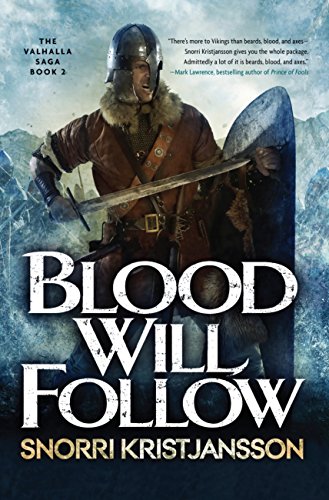
![]() Blood Will Follow by Snorri Kristjansson
Blood Will Follow by Snorri Kristjansson
In my review of Snorri Kristjansson’s first Viking book, Swords of Good Men, I pointed to how the action was generally a positive but issues of pace, POV, and characterization made the book fall somewhat short (I gave it three stars). Now his follow-up, Blood Will Follow is out, and while it improves in some areas, some flaws still carry over while the action has become, I thought, less compelling. I’m still giving this one three stars, but it’s a bit more shaky. Warning: spoilers for book one to follow.
Swords of Good Men introduced a Scandinavian setting set during a time of upheaval. Young King Olav is sweeping through spreading Christianity via the sword and trying to wipe out the old gods, who understandably don’t take kindly to the attempt and find themselves some proxy humans. The town of Stenvik becomes the crossroads of the dispute as Olav’s force, the townsfolk, and a group of faithful-to-the-Norse-gods raiders all meet for some old-fashioned Viking violence. By the end (here be spoilers), Olav has taken Stenvik and two of our main characters — Audun and Ulfar — have been “cursed” with not being able to die.
Blood Will Follow picks up shortly thereafter. The opportunistic healer Valgrad, who swiftly pulled out his in-case-of-successful-siege-by-Christians cross at the end of the Stenvik battle has been accepted as an advisor to Olaf. Really, though, what he wants is the Norse witch’s secret magic — the same magic that gave Audun and Ulfar their seeming immortality (Valgrad is the only one who saw evidence of this). He and a band of equally opportunistic Vikings head north in search of that magic. Meanwhile, Ulfar and Audun, who had left Stenvik together, separate, with Ulfar heading home to inform his uncle of the death of his son and Audun heads south. Neither of them, however, is able to run from what has happened to them, and neither finds sanctuary where they hope to. Violence follows both, nor are the gods done meddling with their lives.
My big problem with the POV in book one, Swords of Good Men, was that it moved far too quickly from one to the other. That seems to be less true in Blood Will Follow, and I appreciated spending more time in each segment (mostly we switch amongst Ulfar, Audun, and Valgrad). Or at least, I appreciated it in terms of readerly focus and authorial style. I was less enamored with the content of their segments, though. Basically, Blood Will Follow is a road-trip novel. Each character is traveling a goodly distance and the book is therefore a picaresque collection of ad hoc adventures. None of which particularly interested me, save one or two. Too often I felt like I was moving through points B, C, D, etc. just so the author could get a character from Point A to Point Z. If the scenes had some more depth to them — a means to deepen or fill out my understanding of character, say (they did to some extent, but not enough to warrant the time) — or even a more robust stylistic/linguistic verve, I might have been more tolerant, but mostly they just felt plodding. And so pacing, as in book one, remains a problem.
Another carry-over issue — I just don’t find the main characters particularly intriguing. The few scenes where the book came more alive occurred because the side characters (Odin, a strong-willed widow, a sharp-tongued female prisoner) were much more compelling than the major ones. On the one hand, this is an improvement over the first book, which mostly had forgettable minor characters. On the other hand, it isn’t a great thing when the three characters you spend the most time with are made pale shadows by the more minor characters.
Other issues from book one still remain noticeable, even if they’re relatively minor—dialogue sometimes is jarringly modern, transitions can be abrupt, settings a bit thin, etc. On a positive note, the sense of this being a pretty realistic portrayal of the time and place continues — it’s a rough and tumble, violent and mostly ugly world, filled with cruelty and crudeness and the occasional bright spots of humor or human connection.
It’s not giving much away to say that by the end stories converge somewhat. I just wish the journey to get to that point had been more meaningful. It seemed to me that could have happened in the first third or half of this book and then carried forth. As it is, Blood Will Follow feels a bit like it falls into that dreaded second book trap — more a placeholder than a novel that moves plot and character forward. I’ll still pick up book three, but I’m hoping for better.






I just read a disappointing second book in a series too. I always hope, magically, that the things I didn’t like in Book One will have changed in Book Two, even though realistically Book Two is already written and in the pipeline when I’m reading the first one, so the author hasn’t had the benefit of my wisdom yet. I mean surely once they read our reviews they’re going to fix the writing deficits we’ve helpfully pointed out, right?
Shall we each hold out hope for our respective Book Threes?
That’s a god point about how so much of book two is already done, so why expect big changes. Readers–always the optimists . . .
Crossing my fingers for both book threes